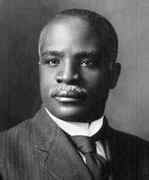Person: Miller, Kelly

Kelly Miller was an African-American mathematician, sociologist, essayist, newspaper columnist and author.
Mathematical Profile (Excerpt):
- 1865, when Kelly was two years old, Union troops led by General Sherman destroyed large parts of his hometown of Winnsboro.
- Kelly benefited from a newly set up primary school where he received an education.
- Richardson, who taught Kelly humanities and classics, realised that he had considerable talents, particularly in mathematics, and he recommended that Kelly continue his education at the Fairfield Institute in Winnsboro, an Institute for African-Americans founded by Richardson who was its first principal.
- Miller was awarded a scholarship to study there but had to take a 3-year Preparatory Course covering Latin, Greek, and mathematics before attending the College of Arts and Sciences at Howard.
- However, Miller was able to complete the Preparatory Course in two years, 1880-82, and entered the College of Arts and Sciences of Howard in 1882.
- Entry was by a test administered by a Civil Service Commission which Miller passed.
- After the award of his B.S., Miller continued to work at the Pension Office while he considered applying to undertake postgraduate studies at Johns Hopkins University.
- Johns Hopkins University had never admitted an African-American so Miller's application was considered by the Board of Trustees.
- His application was supported by Simon Newcomb who had written directly to the University President, Daniel Coit Gilman, arguing that Miller should be admitted.
- The Board of Trustees agreed to admit Miller and he began postgraduate studies at Johns Hopkins University in 1887.
- He did not receive a doctorate, however, for the University decided to make a substantial increase in their fees and Miller was forced, for financial reasons, to give up his studies.
- In 1890, Miller was appointed as a professor of mathematics at Howard University.
- Miller served as professor of mathematics at Howard for five years then, in 1895, he was appointed as professor of sociology at Howard.
- We will look below at some of the topics and arguments that Miller put forward in these works.
- However, one has to point out at this stage that Howard University, although set up to educate African-Americans, still had a white president from the time of its foundation through Miller's period as dean.
- He realised that Miller was a dean with a huge national reputation and he decided to curtail his power inside the university.
- In 1919 he demoted Miller to dean of a newly created junior college which only existed for six years.
- Although Miller retained his high national profile, writing a weekly column published in over 100 newspapers from 1920 to 1940, he was sidelined at Howard.
- Accused of treating the students and the African-American staff at Howard "as a subordinate caste" by Crisis, a publication of which Miller was an assistant editor, Durkee resigned in 1926.
- Although Miller continued to serve the university as professor of sociology until his retirement in 1934, he never regained his position of influence there.
- Following Durkee's resignation, there was a move by former students to have Miller appointed as the first African-American president of Howard but it was not successful.
- Let us now examine Miller's arguments on educating African-Americans.
- Miller did not argue against segregation, despite believing it wrong.
- Given these developmental and modernizing tasks, and the racist opposition which they faced, Kelly Miller was convinced that only a rational, moderate approach could help blacks make sustained and sure progress.
- This, of course, did not stop Kelly Miller, or any of the Old Crowd leadership from trying to continue to lead black America.
- Miller continued to write articles, he became a syndicated columnist for many black newspapers, and continued to convey his views.
- In the 1920s, these views, as well as Miller's leadership, were roundly condemned, and in some quarters dismissed.
- Miller's life was mostly devoted to his academic duties and his writings.
Born 23 July 1863, Winnsboro, South Carolina, USA. Died 29 December 1939, Washington, D.C., USA.
View full biography at MacTutor
Tags relevant for this person:
African American, Origin Usa
Thank you to the contributors under CC BY-SA 4.0! 

- Github:
-

- non-Github:
- @J-J-O'Connor
- @E-F-Robertson
References
Adapted from other CC BY-SA 4.0 Sources:
- O’Connor, John J; Robertson, Edmund F: MacTutor History of Mathematics Archive
